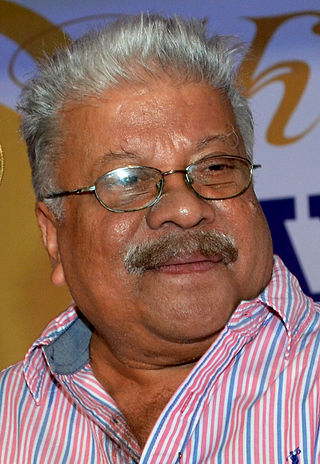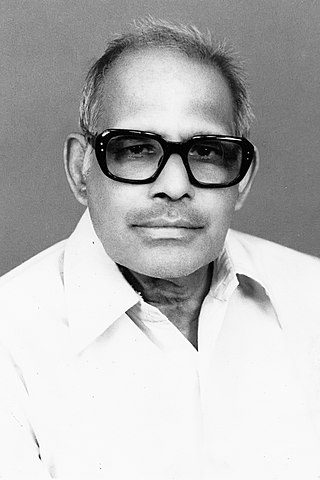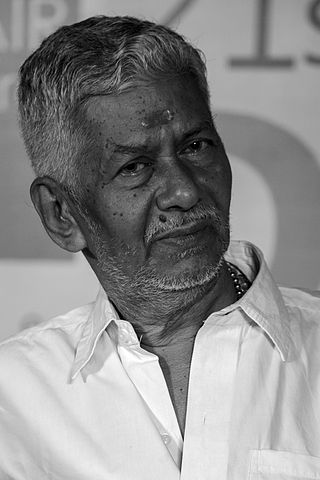
Attoor Ravi Varma was an Indian poet and translator of Malayalam literature. One of the pioneers of modern Malayalam poetry, Ravi Varma is a recipient of Kendra Sahitya Akademi Award, Kerala Sahitya Akademi Award for Poetry and Kerala Sahitya Akademi Award for Translation, besides many other honours. The Government of Kerala honoured him with their highest literary award, the Ezhuthachan Puraskaram, in 2012 and the Kerala Sahitya Akademi inducted him as their distinguished fellow in 2017.

M. Sukumaran was an Indian writer of Malayalam literature, best known for his novels and short stories with political undertones. Marichittillathavarude Smarakangal, Seshakriya, Chuvanna Chihnangal and Janithakam feature among his works and five of his stories have been adapted into films. A two time recipient of the Kerala State Film Award for Best Story, Sukumaran received the Kerala Sahitya Akademi Award for Story in 1976 and the Sahitya Akademi Award in 2006.

Panayanthitta Kunhiraman Nair, also known as Mahakavi P, was an Indian writer of Malayalam literature. He was known for his romantic poems which detailed the natural beauty of his home state of Kerala in South India as well as the realities of his life and times. He received the inaugural Kerala Sahitya Akademi Award for Poetry in 1959. He was also a recipient of the Sahitya Akademi Award.
Moorkkanaat Krishnankutty Menon, better known by his pen name Vilasini, was an Indian writer from Kerala who wrote in Malayalam-language. He is the author of India's longest novel, Avakasikal, for which he won the Kendra Sahitya Akademi Award in 1981 and Vayalar Award in 1983. His first novel Niramulla Nizhalukal won the Kerala Sahitya Akademi Award in 1966.

George Varghese Kakkanadan, commonly known as Kakkanadan, was an Indian short-story writer and novelist in the Malayalam language. His works broke away from the neo-realism that dominated Malayalam literature through the 1950s and 1960s. He is often credited with laying the foundation of modernism in Malayalam literature. He is a recipient of Kendra Sahitya Akademi Award and Kerala Sahitya Akademi Awards in addition to numerous other awards and recognitions.

Punathil Kunjabdulla was an Indian writer from Kerala. A medical doctor by profession, Kunjabdulla was a practitioner of the avant-garde in Malayalam literature. His work includes more than 45 books, including 7 novels, 15 short story collections, memoirs, an autobiography and travelogues. His work Smarakasilakal won the Central and State Akademi Awards.
Muttathu Varkey was an Indian novelist, short story writer, and poet of Malayalam. He was best known for a genre of sentiment-filled romantic fiction known as painkili (janapriya) novel in Malayalam literature.
N. P. Mohammed, popularly known by his initials N. P., was an Indian novelist, short story writer and screenwriter of Malayalam language. Along with his contemporaries like M. T. Vasudevan Nair, O. V. Vijayan, Kakkanadan, and Madhavikutty, he was known to have been one of the pioneers of modernist movement in Malayalam fiction. He was the president of Kerala Sahitya Akademi and a recipient of several awards including Kendra Sahitya Akademi Award, Kerala Sahitya Akademi Award for Story, Kerala Sahitya Akademi Award for Novel, Lalithambika Antharjanam Award, Padmaprabha Literary Award and the Muttathu Varkey Award.

Olappamanna Mana Subramanian Namboothirippad, better identified by his family name, Olappamanna , was an Indian poet of Malayalam literature. A former chairman of Kerala Kalamandalam and an author of 20 books of poetry, his poems were noted for their explicit social expressions. He received two awards from Kerala Sahitya Academy and another from Kendra Sahitya Academy, besides honours such as Government of Madras Poetry Prize, Odakkuzhal Award, N. V. Puraskaram, Asan Smaraka Kavitha Puraskaram and Ulloor Award.
Malikathazhathu Pulluvazhy Narayana Pillai, affectionately known as Nanappan among his friends, was a journalist and writer of Malayalam literature. Known for his novel, Parinamam, and a number of short stories including Murugan Enna Pambatty and George Aaramante Kodathi, Pillai was associated with Far Eastern Economic Review and McGraw-Hill World News. He was awarded the Kerala Sahitya Akademi Award for Novel in 1991, but he declined the award.

Subhash Chandran is a Malayalam novelist, short story writer and journalist from Kerala, India. His work includes the 2010 novel Manushyanu Oru Aamukham and the stories "Vadhakramam", "Sanmargam", "Parudeesa Nashtam" and "Gotham", which have been adapted into films. Chandran is the only writer to receive Kerala Sahitya Akademi Awards for both his debut story collection (2001) and debut novel (2011).

S. Ramesan Nair was an Indian lyricist and poet who worked predominantly in the Malayalam film industry. Over his career he wrote songs for over 170 films and over 3,000 devotional songs outside of the films. He debuted with the movie Pathamudhayam in 1985. He was a recipient of the Kerala Sahitya Akademi Award in 2010 and the Kendra Sahitya Akademi Award in 2018 for his collection of poems Gurupournami.
Raamanam is a 2009 Malayalam film directed and produced by M. P. Sukumaran Nair. Jagathy Sreekumar plays the lead character in this film. The film is a re-depiction of Smarakasilakal, a celebrated Malayalam novel by Punathil Kunhabdulla.

Sippy Pallippuram is an Indian writer of children's literature in Malayalam who has won several awards including Kendra Sahitya Akademi Award and Kerala Sahitya Akademi Award. His novel about the memories of Kunjunni Mash Oridathoru Kunjunni won the national award for children's literature by Kendra Sahitya Akademi. His book Unnikalkku Noottiyettu Gurudeva Kathakal received the Kerala Sahitya Akademi Award for Children's Literature in 2013. A teacher by profession, he has over 80 poetries and stories to his credit in the children's category of Malayalam literature. Sippy has been into children's literature for more than four decades.

K. P. Ramanunni (Malayalam:കെ.പി.രാമനുണ്ണി) is a novelist and short-story writer from Kerala, India. His first novel Sufi Paranja Katha won the Kerala Sahitya Akademi Award in 1995 and the novel Daivathinte Pusthakam won the Kendra Sahitya Akademi Award in 2017. Jeevithathinte Pusthakam won the 2011 Vayalar Award.

Prabha Varma is a poet, lyricist, journalist and television presenter known for his works in Malayalam cinema. He has published ten collections of poems, three novels in verse, six books on the contemporary socio-political milieu and literature, six collections of essays in criticism, a study on media, a travelogue and a novel in english.

Agnisakshi is a Malayalam novel written by Lalithambika Antharjanam. Originally serialised in Mathrubhumi Illustrated Weekly, it was published as a book by Current Books in 1976. It tells the story of a Nambudiri woman, who is drawn into the struggle for social and political emancipation but cannot easily shake off the chains of tradition that bind her. The novel was concerned with implied criticism of aspects of social structure and behaviour.

Susmesh Chandroth is an Indian writer, who writes in Malayalam. He won the first Yuva Puraskar for Malayalam in 2011 instituted by the Sahitya Akademi, Government of India. Susmesh Chandroth is also involved in the Malayalam film industry. He scripted and directed the feature film Padmini (film) based on the life story of the painter T. K. Padmini in the year 2018.

K. V. Ramanadhan was an Indian children's writer in Malayalam. He received the Kerala Sahitya Akademi Award for Children's Literature in 1994 for his work Atbhutha Nirali, the C. G. Santhakumar Award by the Kerala State Institute of Children's Literature in 2011 and the Kendra Sahitya Akademi Award for Children's Literature in 2014 for his overall contribution to the field of children's literature.














